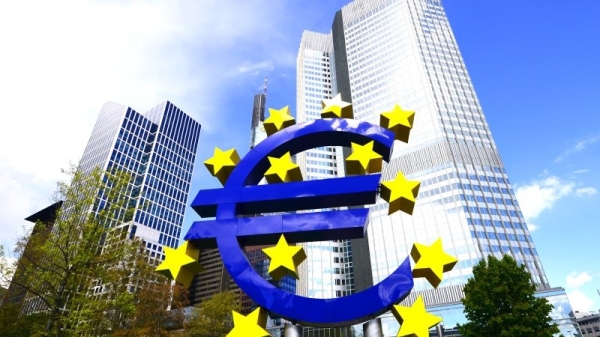ECB: Monetary policy’s drag on European economy is peaking

The eurozone economy has likely already suffered the worst effects of the European Central Bank’s (ECB) restrictive monetary policy over the past two years, a senior ECB official said on Wednesday (13 March).
“We estimate that the highest negative impact of the tightening of monetary policy on growth probably took place already in the second half of 2023, or it may be taking place now, at the beginning of 2024,” ECB’s Director General for Economics, Oscar Arce, said at an event hosted by the Belgian government in Brussels.
Arce added that although “there is a lot of uncertainty when estimating the real-time impact of monetary policy” the ECB still predicts that “it will reduce growth at a lower pace in the coming quarters with respect to what we have seen over the last year or so”.
The ECB hiked rates on ten consecutive occasions over the period July 2022 to September 2023 after Russia’s full-scale invasion of Ukraine sent prices soaring across the EU, bringing its key interest rate from negative levels to a record high of 4%.
Eurozone inflation has since fallen from a peak of 10.6% in October 2022 to 2.6% last month: mere decimal points above the ECB’s 2% target rate.
However, falling prices have been coupled with stagnant or even declining growth across much of the currency union — a fact that many analysts blame at least in part on ECB policy.
At the bank’s most recent monetary policy meeting last week — when it held rates steady at 4% for the fourth successive occasion — the ECB slashed its growth projections for the eurozone for 2024 from 0.8% to just 0.6%: just 0.1 percentage point more than last year.
ING analyst begs to differ
Carsten Brzeski, an economist at ING bank, expressed scepticism about Arce’s remarks, although he agreed that it is “extremely hard” to estimate the impact of monetary policy on growth.
“I’m not 100% convinced by what he said,” Brzeski told Euractiv. “The impact [of ECB policy] on the real economy is still going to take a while.”
Brzeski pointed to the fact that net demand for new loans in the eurozone has been negative for the past several quarters, which he said will ultimately translate into lower investment and growth going forward.
“To me, this means we will still see a significant downward impact from the tightening of the last one-and-a-half years,” he said.
Rebecca Christie, a senior fellow at Bruegel, a Brussels-based think-tank, suggested that Arce’s comments are laying the groundwork for rate cuts soon, while leaving room for the possibility of inflation remaining persistently above the bank’s 2% target rate in future.
“Arce is acknowledging that the fight against inflation has squeezed the economy and wants to signal that policy won’t get in the way of recovery,” she told Euractiv.
“Given how badly the euro area needs a strong recovery, it’s heartening to hear policymakers say they’re going to try to not get in the way of a rebound,” she added.
Arce’s comments were delivered on the same day that Eurostat, the EU’s official statistics office, reported that industrial output in Germany, the EU’s largest economy and historically its manufacturing powerhouse, grew 0.6% month-on-month in January: a significant uptick compared to December, when output fell 1.8%.
The finding represents a rare piece of good news for Germany, which has suffered more economic pain than most other EU member states over the past two years due to its previous heavy reliance on cheap Russian energy.
In February, the European Commission’s winter forecast showed the German economy contracted by 0.3% last year, making it the worst performer among all advanced economies.
The day before the EU executive’s data release, Berlin had slashed its own growth forecast for 2024 from 1.3% to just 0.2%, prompting German economy minister Robert Habeck to say the country was in “dramatically bad” economic shape.
[Edited by
Read more with Euractiv




